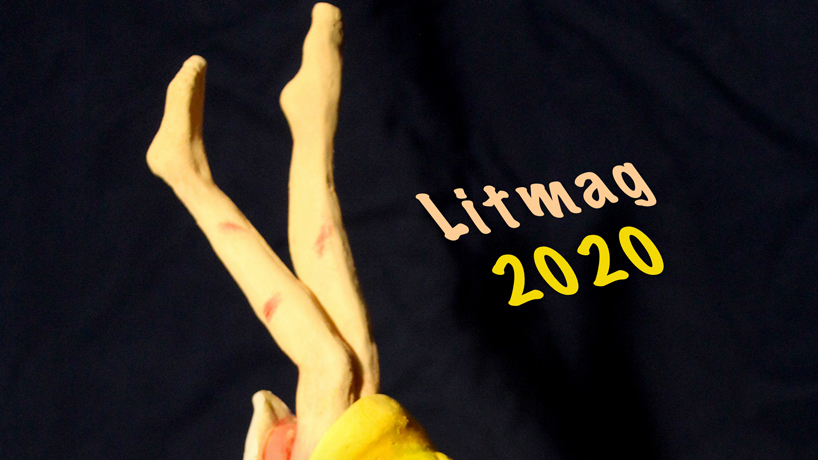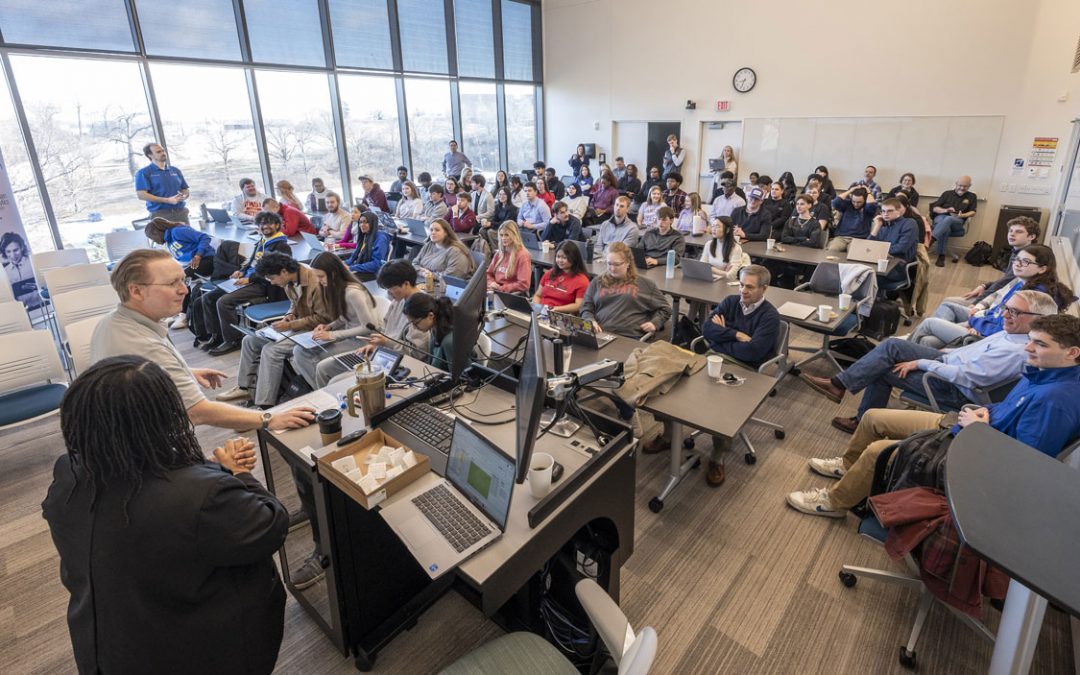
In response to the onset of COVID-19, the staff members and faculty advisers of Litmag and The Current decided to move the releases of their latest editions online. Despite the challenge, both staffs produced excellent publications according to their faculty advisers. (Litmag cover artwork by Luna Noelle)
Camris Owens is the editor-in-chief of the 32nd installment of Litmag, the annual student-run University of Missouri–St. Louis literary and art journal comprised of works from creators in the campus community. But it’s not the first time the senior has edited a literary journal.
“From fifth or sixth grade, my friend and I had a journal,” Owens said. “I would take it home and write a poem in it, and I would bring it to school the next day and give it to her. She would write a poem, and we’d go back and forth.”
With Owens’ passion for writing and desire to lead, it’s no surprise she took the helm of Litmag. What no one expected, though, was putting together the publication during a pandemic.
In response to the onset of COVID-19, the staff members and faculty advisers of Litmag and The Current, a student-led news publication, decided to move the releases of their latest editions online.
“From the first opportunity we had to reconvene after we learned campus was going to close and everything was going to move online, the students were adamant that we were going to publish something one way or another,” said Kate Watt, assistant teaching professor of English.
Watt, the Litmag faculty adviser, took submissions from October until March 1, receiving about 250 pieces of artwork, poetry and prose. The process to cull those submissions and decide on a vision for the magazine is difficult even without the added challenge of working during a pandemic.
“It’s a huge undertaking, but one that is incredibly rewarding because you know our authors and our artists need a space to be able to showcase their work,” Watt said.
She noted the students only have a little more than three months – from the end of January to the end of April – to produce the finished product. Ultimately, the staff selected 55 pieces for publication – and just in time. Aurora Blanchard, the lead designer, said the layout was nearly set when staff members realized they would have to finish the magazine remotely.
“Right before COVID-19 happened, the week that campus closed I was in the social sciences building right up until 5 p.m. trying to get the layout,” Blanchard said. “I was trying to get a general idea of the page count. I knew if I didn’t have access to the design program immediately, there’d be some type of delay for production, so I was really hell-bent on getting a static page count before the campus closed.”
Meanwhile, The Current was ready to debut its new look as a magazine. Ryan Krull, The Current faculty advisor and assistant teaching professor of communication and media, said the publication has taken various forms over the years.
“At some point, the students decided they wanted to do something that looked more like a magazine – something that came out less often but was more highly produced,” Krull said. “We were getting ready to release the first issue and the new design in March, and then COVID hit. Obviously, that put a pause on everything.”
The issue, which launched May 6, remained largely the same with the exception of the cover story. Krull said The Current staff turned the production delay into an opportunity to write a timely, “glass-half-full” story about graduating during a pandemic.
Obviously, the digital release is not what the students had envisioned originally, but Stephanie Daniels, The Current editor-in-chief, said it was still a positive experience.
“It offered a way for us to meet our readers where they were,” Daniels said. “Most people took to the digital world in the wake of the pandemic. At first, we planned to release our publication in a new, fresh way – as a magazine rather than a traditional newspaper. Though we all were disappointed in not being able to stick with that plan, we found inspiration in a digital format. It was a really fun process to put it all together, and honestly, it is an amazing piece of work that is due to our amazing team.”
Blanchard and Owens had similar feelings about Litmag, which launched May 4. They both found that the transition to remote work went well considering the circumstances.
“It was emotionally challenging because of the uncertainties and fears everyone had,” Owens said. “But a lot of what we have to do is online. All of the artwork and the poems, we have to review it digitally. So, I think the transition was smooth.”
Blanchard credited Owens, Watt and the university with easing the transition.
“Kate is a really hands-on advisor, so she’s always available for questions,” Blanchard said. “There was a week where Camris and I called or FaceTimed each other every single day to make sure that we were getting everything done that we needed to get done. Then, also the school let us use Adobe InDesign software for free.”
Choosing the direction for the latest edition was a highly collaborative process. Above all else, the students wanted to ensure the magazine would be diverse in content and creators.
“We wanted to include material that students, faculty and staff have avoided,” Blanchard said. “For example, the winner of the poetry contest is about the events that happened in Ferguson, and a lot of the artwork is reflective of diverse points of view.”
One theme that is represented strongly throughout the magazine is motherhood. As a mother herself, Owens was excited to explore the complexities of the subject in Litmag.
“The way we usually celebrate Mother’s Day, we may not be able to do that this year,” Owens said. “I’m a mother. Kate’s a mother. We have both had to be parents while learning and working. It’s just something I would like for women or mothers to enjoy.”
The staff was also particularly fond of the eye-catching cover, featuring a piece titled, “The Red Herring” by Luna Noelle. It depicts a fish swallowing a person whole – imagery that turned out to be very apt.
“Everybody really responded positively to that,” Watt said. “The symbolism that exists there between man and nature and the current juncture of the world battling what nature has thrown at us. We just thought that was well timed and fitting for our issue.”
Ideally, Litmag will have a print release in the fall, but Watt said there are a lot of variables to consider. Overall, Krull and Watt were impressed with what their students achieved during a such difficult time.
“I’m stoked about it,” Krull said. “I feel like it was greater than the sum of its parts.”
As for Blanchard and Owens, their future prospects remain open after graduation. Owens has been accepted to a graduate program but is still weighing whether it’s right for her. Blanchard is set to graduate in December and hopes to go into publishing – specifically cook books.
“I’m honestly nervous about the future and the economy because of the crisis, but I’m excited because the staff has made a product in a time when a lot of other things shut down,” Blanchard said. “I think this really gives us an edge in the job market if we can prove that, ‘Hey, we were able to collaborate, communicate and produce a product completely at home.’ I think this applies to other jobs, and this applies to things that we could do in the future.”














